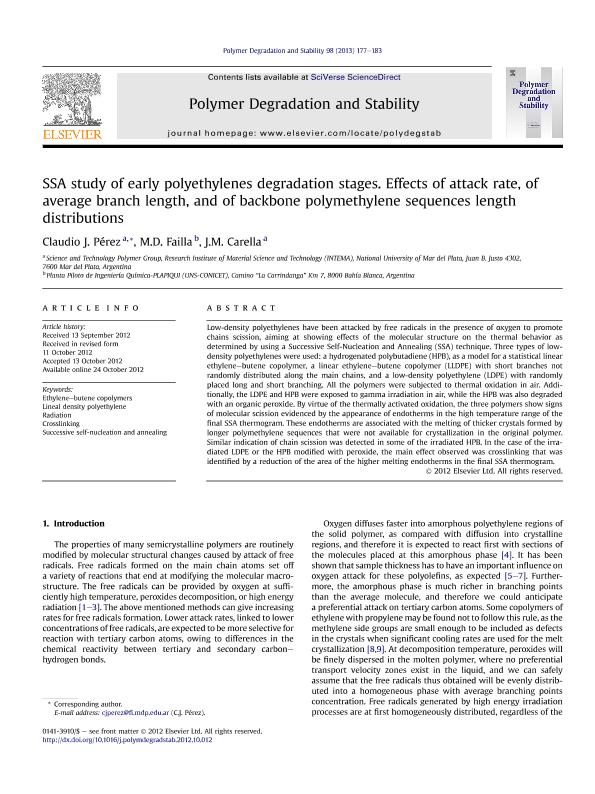Artículo
SSA study of early polyethylenes degradation stages. Effects of attack rate, of average branch length, and of backbone polymethylene sequences length distributions
Fecha de publicación:
24/10/2012
Editorial:
Elsevier
Revista:
Polymer Degradation And Stability
ISSN:
0141-3910
Idioma:
Inglés
Tipo de recurso:
Artículo publicado
Clasificación temática:
Resumen
Low-density polyethylenes have been attacked by free radicals in the presence of oxygen to promote chains scission, aiming at showing effects of the molecular structure on the thermal behavior as determined by using a Successive Self-Nucleation and Annealing (SSA) technique. Three types of low-density polyethylenes were used: a hydrogenated polybutadiene (HPB), as a model for a statistical linear ethylene–butene copolymer, a linear ethylene–butene copolymer (LLDPE) with short branches not randomly distributed along the main chains, and a low-density polyethylene (LDPE) with randomly placed long and short branching. All the polymers were subjected to thermal oxidation in air. Additionally, the LDPE and HPB were exposed to gamma irradiation in air, while the HPB was also degraded with an organic peroxide. By virtue of the thermally activated oxidation, the three polymers show signs of molecular scission evidenced by the appearance of endotherms in the high temperature range of the final SSA thermogram. These endotherms are associated with the melting of thicker crystals formed by longer polymethylene sequences that were not available for crystallization in the original polymer. Similar indication of chain scission was detected in some of the irradiated HPB. In the case of the irradiated LDPE or the HPB modified with peroxide, the main effect observed was crosslinking that was identified by a reduction of the area of the higher melting endotherms in the final SSA thermogram.
Archivos asociados
Licencia
Identificadores
Colecciones
Articulos(CCT - MAR DEL PLATA)
Articulos de CTRO.CIENTIFICO TECNOL.CONICET - MAR DEL PLATA
Articulos de CTRO.CIENTIFICO TECNOL.CONICET - MAR DEL PLATA
Articulos(INTEMA)
Articulos de INST.DE INV.EN CIENCIA Y TECNOL.MATERIALES (I)
Articulos de INST.DE INV.EN CIENCIA Y TECNOL.MATERIALES (I)
Articulos(PLAPIQUI)
Articulos de PLANTA PILOTO DE INGENIERIA QUIMICA (I)
Articulos de PLANTA PILOTO DE INGENIERIA QUIMICA (I)
Citación
Pérez, Claudio Javier; Failla, Marcelo Daniel; Carella, Jose Maria; SSA study of early polyethylenes degradation stages. Effects of attack rate, of average branch length, and of backbone polymethylene sequences length distributions; Elsevier; Polymer Degradation And Stability; 98; 1; 24-10-2012; 177-183
Compartir
Altmétricas




